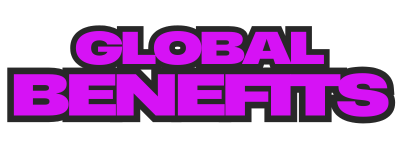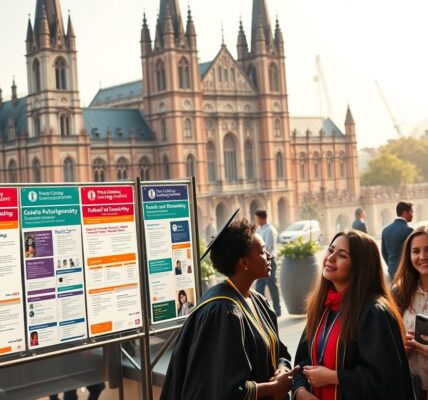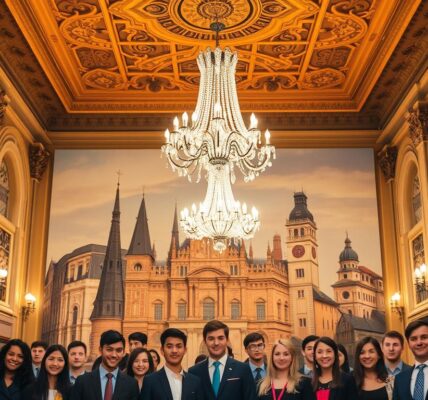Corporate & Foundation Grants Demystified: Securing Private Scholarships for Every Field
In Nigeria, private funding is transforming the education landscape. Programs backed by organizations like the Mastercard Foundation are creating life-changing opportunities for students. With over $3 billion invested in African education, these initiatives are making a significant impact.
Fields like STEM, healthcare, and social sciences are particularly benefiting. For example, the Mastercard Foundation has supported over 40,000 scholars globally, with 70% being young women. This focus on empowerment is reshaping futures.
Other notable programs include Coca-Cola, MTV Staying Alive, and the Zayed Prize. These efforts are not just about funding but also about building skills and fostering innovation. For Nigerian students, these scholarships are a gateway to brighter prospects.
What Are Corporate & Foundation Scholarships?
Private initiatives are opening doors for Nigerian students through targeted funding. These programs, often part of corporate social responsibility (CSR) efforts, provide financial aid to learners in specific fields. They aim to bridge gaps in education and empower individuals to achieve their potential.
Many of these initiatives align with the United Nations Sustainable Development Goals (SDGs). For example, they focus on quality education, gender equality, and reducing inequalities. In Nigeria, this alignment helps address local challenges while fostering global progress.
Definition and Purpose
Corporate and foundation scholarships are financial aid programs funded by private organizations. They target specific areas like STEM, healthcare, and social sciences. Their purpose is to provide access to education for underserved communities and support skill development.
“Education is the most powerful weapon which you can use to change the world.” – Nelson Mandela
Importance for Students in Nigeria
For Nigerian students, these programs are a lifeline. They offer support for tuition, books, and other educational expenses. This financial aid reduces barriers and enables more students to pursue higher education.
Programs like the MTV Staying Alive Foundation focus on health education, particularly HIV prevention. Meanwhile, the Mastercard Foundation aims to provide 100,000 scholarships by 2030. These efforts not only fund education but also build stronger communities.
Why Corporate & Foundation Scholarships Matter
Access to education is becoming more attainable through private financial aid. These initiatives provide critical support to students, helping them overcome financial barriers and focus on their studies. For many, this assistance is a stepping stone to a brighter future.
Financial Support for Education
Private financial aid programs cover a wide range of expenses. For example, the Black Heart Scholarship helps with accommodation, materials, and extracurricular costs. A staggering 70% of recipients report reduced financial stress, allowing them to concentrate on their academic goals.
- Boeing’s STEM leadership programs connect scholars with industry leaders, fostering career readiness.
- The Mastercard Foundation’s alumni network, with over 20,206 members, offers mentorship and networking opportunities.
- A Cambridge PPE scholar used funding to pursue unpaid internships, gaining valuable experience.
Opportunities for Career Growth
These programs don’t just fund education—they open doors to career growth. For instance, the Coca-Cola Foundation’s women empowerment initiatives in West Africa have helped countless women build successful careers. Such efforts ensure that students are not only educated but also equipped for the workforce.
“Investing in education is investing in the future of a nation.”
By providing financial support and career-building opportunities, private financial aid programs are transforming lives. They empower students to achieve their dreams and contribute meaningfully to society.
Types of Corporate & Foundation Scholarships
Private organizations are stepping up to support education through diverse funding programs. These initiatives cater to various needs, from project execution to skill development, ensuring students and professionals can thrive in their chosen fields.
Project-Based Grants
Project-based grants focus on specific initiatives that drive change. For example, the Coca-Cola Foundation supports water stewardship projects, while Nestlé awards prizes for social value creation. These programs encourage innovation and practical solutions to real-world problems.
Capacity-Building Grants
Capacity-building grants aim to strengthen skills and knowledge. The Rockefeller Brothers Fund, for instance, offers peacebuilding grants that empower individuals and communities. Such programs are essential for long-term development and sustainability.
Research Grants
Research grants support studies that address critical issues. The Toyota Environmental Grant, for example, focuses on biodiversity and environmental conservation. These grants enable researchers to explore solutions that benefit society and the planet.
Scholarships and Fellowships
Scholarships and fellowships provide financial aid and professional growth opportunities. ViiV Healthcare’s HIV-focused fellowships and the Mastercard Foundation’s Resolution Social Venture Challenge are prime examples. These programs not only fund education but also foster leadership and innovation.
Eligibility Criteria for Corporate & Foundation Scholarships
Understanding the eligibility criteria is key to securing private financial aid. These programs often have specific requirements that applicants must meet to qualify. From regional focus to academic performance, each initiative has unique expectations.
Geographic Focus
Many programs prioritize applicants from specific regions. For example, the Mastercard initiative focuses on Sub-Saharan Africa, with 85% of its scholars coming from this area. This regional focus ensures that funding reaches those who need it most.
Academic Requirements
Academic performance is another critical factor. Most programs require a minimum GPA of 3.0 or higher. Additionally, some initiatives, like the Black Heart program, ask for a detailed financial need statement to assess eligibility.
Alignment with Organizational Values
Applicants must align with the mission of the funding organization. For instance, the Zayed Prize looks for projects in renewable energy, while MTV Staying Alive seeks youth leaders in health education. Boeing’s programs, on the other hand, prioritize those pursuing careers in aviation.
- Mastercard prioritizes African applicants, focusing on Sub-Saharan Africa.
- Minimum GPA requirements are common, often set at 3.0 or higher.
- The Zayed Prize requires alignment with renewable energy goals.
- MTV Staying Alive looks for youth leadership in health education.
- Boeing’s programs emphasize career alignment with aviation.
How to Find Corporate & Foundation Scholarships
Discovering financial aid opportunities requires a strategic approach. With numerous programs available, students need to know where to look and how to maximize their chances of success. This section outlines practical steps to identify and apply for these opportunities.
Researching Opportunities
Start by exploring programs that align with your goals. The Mastercard Foundation, for example, partners with 29 institutions globally, offering tailored support for students. Other portals like Black Heart’s application portal provide detailed information on available funds.
Tracking deadlines is crucial. Programs like Black Heart have specific cycles in March and August. Staying organized ensures you don’t miss out on valuable opportunities.
Utilizing Online Resources
Online platforms are a treasure trove of information. Websites like Mastercard’s partner page and Cisco’s Global Impact network connect tech students with relevant programs. These resources simplify the application process and provide clear guidelines.
- Join networks like Cisco’s Global Impact for tech-focused opportunities.
- Explore Mastercard’s partner page for tailored programs.
- Check Black Heart’s portal for application cycles and requirements.
Networking with Organizations
Building connections can open doors to funding. Attend events like Ford Foundation’s Lagos networking sessions to meet representatives and learn about available programs. Directly contacting offices, such as Nestlé Nigeria’s CSR team, can also provide valuable insights.
Networking not only helps you gain access to opportunities but also builds relationships that can support your academic and career journey.
The Application Process: Step-by-Step Guide
Navigating the application process for financial aid can seem daunting, but with the right approach, it becomes manageable. Understanding the steps involved ensures a smoother experience and increases your chances of success. This guide breaks down the process into three key stages: preparation, proposal writing, and submission.
Preparing Your Application
Preparation is the foundation of a successful application. Start by gathering all necessary documents, such as academic transcripts, identification, and proof of financial need. Programs like Black Heart require a personal summary alongside financial proof, while Mastercard works through partner universities.
Create a checklist to stay organized. For example, the MTN Scholarship provides a detailed template for required documents. This ensures you don’t miss any critical components.
Writing a Strong Proposal
A compelling proposal is essential to stand out. Focus on clarity, relevance, and alignment with the program’s goals. For instance, the Zayed Prize emphasizes technical proposals that address renewable energy challenges.
Analyze successful examples, such as a Black Heart essay from a medical student. Highlight your achievements and explain how the funding will help you achieve your goals. Tailor your proposal to reflect the program’s values.
Submitting Your Application
Submission is the final step, but it requires careful attention. Double-check all requirements to ensure completeness. Programs like the Coca-Cola Foundation have a 5-stage review process, so missing details can lead to disqualification.
Be mindful of deadlines and competitiveness. For example, Mastercard’s acceptance rate is only 31%, so submitting a polished application is crucial. Use online portals or direct submissions as specified by the program.
| Program | Key Requirements | Submission Process |
|---|---|---|
| Black Heart | Personal summary, financial need proof | Online portal |
| Mastercard | Partner university endorsement | Direct submission |
| Zayed Prize | Technical proposal | Online application |
| Coca-Cola Foundation | 5-stage review process | Email submission |
Tips for a Successful Scholarship Application
Securing financial aid requires more than just filling out forms; it’s about showcasing your potential and aligning with the program’s mission. To stand out, applicants need to focus on key strategies that highlight their strengths and meet the program’s expectations. Here are some actionable tips to help you craft a winning application.
Highlighting Your Achievements
Quantifying your accomplishments can make a strong impression. For example, instead of saying, “I helped with a project,” write, “I trained 50 peers in coding, improving team efficiency by 30%.” This approach shows measurable impact and aligns with programs like the Ford Foundation, which values alignment with UN Sustainable Development Goals (SDGs).
Successful applicants, like the 2024 SVC winners, used data-driven impact projections to demonstrate their potential. Similarly, E-cold’s AI-integrated solar freezer proposal stood out by clearly outlining its innovative solution and benefits.
Tailoring Your Application
Each program has unique goals and values. Research the organization’s mission and tailor your application to reflect them. For instance, Mastercard Scholars often emphasize leadership and community impact in their essays.
Take time to understand the program’s focus. A Mastercard Scholar shared that they spent three months preparing their application, ensuring every detail aligned with the program’s objectives. This level of preparation can significantly increase your chances of success.
Meeting Deadlines
Timeliness is critical. Many programs, like Black Heart, have strict deadlines, and late submissions are automatically disqualified. Start early to avoid last-minute stress and ensure your application is polished.
Formatting errors can also lead to rejection, with a 22% error rate reported in some programs. Double-check your application for consistency and clarity before submitting it.
- Showcase measurable achievements, like “Trained 50 peers in coding.”
- Align your application with the program’s mission, such as UN SDGs for Ford Foundation.
- Prepare well in advance, following the Mastercard Scholar’s 3-month timeline.
- Proofread to avoid formatting errors, which account for 22% of rejections.
Common Mistakes to Avoid
Avoiding common errors can significantly improve your chances of securing financial aid. Many applicants fail to meet the requirements due to oversights or lack of preparation. Understanding these pitfalls ensures a smoother application process and increases your likelihood of success.
Incomplete Applications
Submitting an incomplete application is one of the most frequent mistakes. For example, 38% of Black Heart applications were rejected due to missing financial documents. Always double-check the requirements and ensure all necessary materials are included.
Programs like Coca-Cola automatically disqualify late submissions. Staying organized and tracking deadlines can prevent such errors. A checklist is a simple yet effective tool to avoid missing critical components.
Ignoring Eligibility Criteria
Overlooking eligibility criteria can lead to immediate rejection. A notable case involved an MTN Scholarship applicant who was disqualified for exceeding the age limit. Always review the program’s requirements thoroughly before applying.
Mastercard reported that 61% of failed applications lacked a focus on community impact. Tailoring your proposal to align with the program’s goals is essential. This ensures your application stands out and meets expectations.
Lack of Follow-Up
Many applicants neglect follow-up actions, which can leave a positive impression. Sending a thank-you note to the selection committee shows professionalism and gratitude. This small gesture can set you apart from other candidates.
Zenith Bank’s 2023 feedback highlighted that generic proposals often fail to make an impact. Personalizing your application and addressing the program’s specific needs can significantly improve your chances.
| Mistake | Consequence | Prevention Tip |
|---|---|---|
| Incomplete Applications | Rejection due to missing documents | Use a checklist to verify requirements |
| Ignoring Eligibility Criteria | Automatic disqualification | Review program guidelines carefully |
| Lack of Follow-Up | Missed opportunity to stand out | Send a thank-you note post-submission |
Examples of Corporate & Foundation Scholarships
Numerous organizations are making a difference in education through targeted financial aid programs. These initiatives provide opportunities for students to pursue their dreams and contribute to their communities. Below are some notable examples of such programs.
The Coca-Cola Foundation
The Coca-Cola Foundation has invested over $12 million in education grants, particularly in Nigeria. They partner with Historically Black Colleges and Universities (HBCUs) to support students in various fields. This program focuses on empowering individuals to achieve their academic and career goals.
Their initiatives also include capacity-building projects that enhance skills and knowledge. For example, they have funded community development programs that benefit thousands of students. This approach ensures long-term impact and sustainability.
MTV Staying Alive Foundation
The MTV Staying Alive Foundation focuses on health education, particularly HIV prevention. In Lagos schools, they implement a peer education model that trains young people to educate their peers. This scholarship program not only provides financial aid but also builds leadership skills.
Their efforts have reached thousands of students, creating a ripple effect in communities. By addressing critical health issues, they empower young people to make informed decisions and lead healthier lives.
The Zayed Future Energy Prize
The Zayed Future Energy Prize awards $3 million annually to innovative projects in renewable energy. In 2023, a Nigerian team won for their solar grid project, which provides clean energy to rural areas. This award recognizes solutions that address global challenges while benefiting local communities.
Their focus on sustainability aligns with the United Nations Sustainable Development Goals (SDGs). By supporting such initiatives, they encourage innovation and practical solutions to real-world problems.
| Program | Focus Area | Impact |
|---|---|---|
| Coca-Cola Foundation | Education & Community Development | $12M+ in grants |
| MTV Staying Alive Foundation | Health Education | Peer education in Lagos schools |
| Zayed Future Energy Prize | Renewable Energy | $3M in awards annually |
“Education is the key to unlocking the world, a passport to freedom.” – Oprah Winfrey
Other notable programs include Nestlé’s ₦5M grants and Mastercard’s full-ride packages. These initiatives, along with 12 other African-focused programs, provide Nigerian students with access to life-changing opportunities. By supporting education, these organizations are shaping a brighter future for individuals and communities alike.
Impact of Corporate & Foundation Scholarships
Private funding initiatives are reshaping futures by empowering individuals and communities. These programs not only provide financial support but also foster personal growth, strengthen communities, and create long-term career opportunities. Their impact is felt across various sectors, from education to innovation.
Personal Development
One of the most significant outcomes of these initiatives is personal development. For example, a UCL History scholar used funding to create a community archive project, preserving local heritage while honing research skills. Such opportunities help individuals build confidence, leadership, and technical expertise.
Mastercard alumni have reported a 73% employment rate within six months of graduation. This success highlights how these programs equip recipients with the skills and knowledge needed to thrive in competitive job markets.
Community Benefits
The community also reaps substantial benefits from these initiatives. E-cold, a project funded by private grants, reduced food waste by 40% in Benin. This not only addressed a local issue but also created jobs and improved food security.
Additionally, 58% of Black Heart recipients have started NGOs, driving positive change in their communities. These efforts demonstrate how private funding can amplify impact beyond individual beneficiaries.
Long-Term Career Advantages
Private funding opens doors to long-term career opportunities. A Boeing scholar, for instance, developed innovations in aviation safety, contributing to global industry standards. Such achievements underscore the transformative potential of these programs.
With over 968,346 direct beneficiaries from Resolution Project ventures, the ripple effect of these initiatives is undeniable. They empower individuals to achieve their dreams while creating lasting development in their communities.
“Empowering individuals today builds a stronger tomorrow.”
These programs are more than just financial aid—they are investments in people and their lives. By supporting education, innovation, and community projects, private funding initiatives are shaping a brighter future for all.
Challenges in Securing Corporate & Foundation Scholarships
Securing private funding for education comes with its own set of challenges. While these programs offer incredible opportunities, the journey to obtaining them is often fraught with obstacles. From intense competition to complex requirements, applicants must navigate several hurdles to succeed.
High Competition
One of the biggest challenges is the sheer volume of applicants. For instance, the MTN Scholarship in 2023 received 15,000 applications for just 200 slots. Similarly, Mastercard’s selection ratio stands at 1:89, highlighting the intense competition. This means only a small percentage of applicants secure funding, making it crucial to stand out.
Geographic limitations also play a role. Data shows that 70% of winners in some programs are based in Lagos, leaving applicants from other regions at a disadvantage. This uneven distribution underscores the need for more inclusive funding opportunities across Nigeria.
Complex Application Processes
The process of applying can be daunting. Many programs require detailed documentation, including financial statements, academic records, and project proposals. For non-English speakers, language barriers add another layer of difficulty, especially when proposals must be submitted in English.
Additionally, measuring and documenting the impact of proposed projects can be challenging. Applicants often struggle to provide clear, data-driven evidence of how their initiatives will benefit their communities. This complexity can deter even the most qualified candidates.
Limited Availability
Another major challenge is the limited availability of funds. Programs like Black Heart only open twice a year, creating a narrow window for applications. This scarcity is particularly evident in STEM fields, where funding opportunities are fewer compared to arts and humanities.
Despite these challenges, understanding the process and preparing thoroughly can improve your chances. By addressing these obstacles head-on, applicants can better position themselves to secure the funding they need.
Success Stories: Inspiring Scholarship Recipients
Behind every successful scholarship recipient lies a story of determination and transformation. These individuals have leveraged financial support to create meaningful change in their lives and communities. Here are three inspiring case studies that highlight the power of educational opportunities.
Case Study 1: Medical Student
A medical student from the University of Leicester used her scholarship to establish a rural clinic in Nigeria. Her work has provided essential healthcare services to underserved communities. This initiative has improved access to medical care for over 1,000 residents.
Her dedication to community health earned her recognition from the Black Heart program. She continues to inspire others by combining her medical expertise with a passion for social impact.
Case Study 2: Engineering Student
An aerospace engineering student from the University of Nigeria, Nsukka (UNN), secured an internship with Boeing through a scholarship. His innovative approach to aviation safety has contributed to industry advancements.
This opportunity allowed him to gain hands-on experience and build a network of professionals. His story demonstrates how scholarships can open doors to global career prospects.
Case Study 3: Social Sciences Student
A sociology student from Ladoke Akintola University of Technology (LAUTECH) founded an NGO focused on gender equality. Her scholarship provided the resources needed to launch this initiative, which has empowered hundreds of women in her community.
Her work aligns with the United Nations Sustainable Development Goals (SDGs), particularly in promoting gender equality. She is a testament to how education can drive social change.
| Recipient | Field | Achievement |
|---|---|---|
| Medical Student | Healthcare | Established rural clinic |
| Engineering Student | Aerospace | Secured Boeing internship |
| Social Sciences Student | Sociology | Founded gender equality NGO |
These stories highlight the transformative power of scholarships. They not only provide financial support but also empower individuals to create lasting change in their communities.
Conclusion
The rise in educational funding initiatives has opened new doors for Nigerian students. Since 2020, there has been a 43% increase in scholarships, reflecting a growing commitment to empowering the next generation. These opportunities align with national development goals, ensuring that students contribute meaningfully to their communities.
Programs like Mastercard’s 2030 vision are transforming African education by providing access and resources. Aspiring applicants are encouraged to apply strategically, focusing on initiatives that match their goals. For example, Black Heart’s August 2025 deadline offers a chance to secure life-changing support.
As a Lagos scholarship recipient once said, “Education is the ultimate social equalizer.” By leveraging these opportunities, students can unlock their potential and drive positive change in their communities.
FAQ
What are corporate and foundation scholarships?
Why are these scholarships important for students in Nigeria?
What types of scholarships are available?
What are the eligibility criteria for these scholarships?
How can I find these opportunities?
What is the application process like?
What tips can improve my application?
What common mistakes should I avoid?
Can you name some examples of these scholarships?
What impact do these scholarships have?
What challenges might I face in securing a scholarship?
Are there success stories from scholarship recipients?
Published on: 29 de May de 2025





